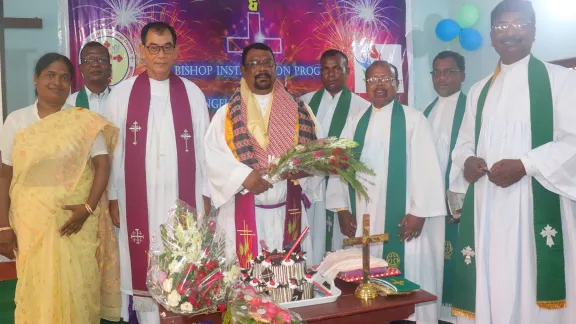Last month, the Nepal Evangelical Lutheran Church looked back at 80 years of grassroots work among poor and marginalized Santal people and installed Joseph Soren as its first bishop.

Newly installed Bishop Joseph Soren (center) with his wife Arlina Murmu, the moderator of the Northern Evangelical Lutheran Church (NELC), India, Rev. Isilash Basumatary and the pastors of the church. Photo: ELC Nepal
Joseph Soren installed as the first Bishop of the Nepal Evangelical Lutheran Church
(LWI) – The Nepal Evangelical Lutheran Church (Nepal ELC) had much to celebrate on 18 July. The 80th anniversary of the church coincided with the installation of Rev. Joseph Soren as the church’s first bishop. The theme was “Celebrating 80 years of God’s grace.”
Hinduism is the predominant religion in Nepal. Christians account for a minority of below 2 percent of about 30 million people. Also, there are over 100 ethnic groups and castes and 124 languages and dialects.
Close ties with India
Born and raised in the Morang District, Joseph Soren was ordained as the first native Nepalese pastor of his church in March 2001 and has led the Nepal ELC as its president since 2010. Nepal ELC joined the National Churches Fellowship of Nepal (NCFN) during that period. “That was very valuable for networking and coordinating with national and international mission agencies and churches,” Soren recalls. Currently, he is an advisor to NCFN and the Nepal Christian Society and is a council member of the Nepal Bible Society. After internal restructuring, Soren was elected as the first bishop of Nepal ELC.
Soren’s installation by the moderator of the Northern Evangelical Lutheran Church (NELC), India, Rev. Isilash Basumatary reflected the close ties between the two churches throughout the decades since its founding. The geographical closeness of the two churches, one in the southeast of Nepal and the other in the northeast of India, played a vital role in these relations.

Welcoming procession for the installation of Bishop Joseph Soren and the anniversary celebrations. Photo: ELC Nepal
The Nepal ELC has its roots in the faith of the laborer Phagu Murmu, who went from the Dumka District, Jharkhand, India, to earn a living in the Morang District in Nepal in 1936. He was a Christian and a member of NELC. Alongside his work, he began sharing the gospel and praying for sick people. On 18 July 1943, the first people he had witnessed to were baptized by Pastor Bhoje Soren, who had been sent from India at the request of Phagu Murmu. This date is regarded as the founding date of the Nepal ELC.
A history with ups and downs
The new church was established among “poor, uneducated, and marginalized Santal people,” explained Rev. Partras Marandi, General Secretary of Nepal ELC. They still comprise most of its membership today. Until 1958, the local Christians led their church under difficult circumstances by themselves. Since then, NELC in India has sent pastors to Nepal to support the Nepal ELC.
From 1958 to 1978, Nepal ELC focused mainly on gathering believers and reestablishing congregations after difficult years. At that time, Nepal was ruled by an autocratic government; religious freedom was restricted, and conversions were forbidden. Nevertheless, the church grew and managed to establish six congregations.
1990 brought a political change in the country, and mission organizations could enter Nepal. One of the challenges of Nepal ELC was its lack of local leadership and finances. By 1994 that had changed: the church had local leaders and had established contact with other mainstream churches.
Until 2003, Nepal ELC was running under NELC, India, as a mission of its mother church. Then it was decided that Nepal ELC should become autonomous. In 2010 Nepal ELC became a member of The Lutheran World Federation (LWF). It was registered with the Nepali government in 2012.
Today, Nepal ELC has about 1,365 members in 12 congregations in the Morang and Jhapa Districts. Six pastors serve the congregations. There are seven lay leaders and evangelists, three women leaders and three youth leaders.
Nepal ELC has established partnerships with the Finnish Evangelical Lutheran Mission (FELM) and Normisjon from Norway, which support much of the diaconal and educational work. The LWF currently supports a project on vulnerable communities’ disaster preparedness, management and response and a project developing leadership and technical skills among youth.
In the last years, legal preconditions to do evangelical work, share the gospel and establish church organizations have become easier.
– Rev. Partras Marandi, General Secretary of Nepal ELC
“In the last years, legal preconditions to do evangelical work, share the gospel and establish church organizations have become easier,” explained Marandi. “For us, it is a God-given opportunity to scale up our evangelical work and community development work in education and health. But we depend on the prayer and support from the global Lutheran communion and mission organizations to achieve that.”


